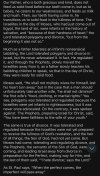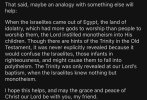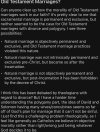A friend passed this to me and asked for my opinion. To be frank, I was flabbergasted by what I read. I had no idea these thought patterns existed. It's definitely a level up (or down?) from any Catholic doctrine I've encountered before. There's so much wrong, but it's stacked and intertwined. It's like an alternate reality. I don't know where to start in a way that would lead someone out of this mire. How would you answer this? Is answering it directly even the right approach?
Here's the subject matter:
View attachment 5361
View attachment 5362
And, for reference, it was given in answer to this:
View attachment 5363
Please don't mind the errors in that "for reference" unless it's critical for rebutting the answer that was given.
Thanks.
How would you answer this? Is answering it directly even the right approach?
I know that responding to every demonstration of foolishness can be great sport, and those who know me know I don't shy away from addressing the polygynelephant in the room, but I'm also certain that many such arguments are better left avoided, and this is a great example.
I wouldn't bother, any more than I would bother attempting to change the mind of someone who vigorously argues that masks work or that Wuhan Flu was anything other than the Great Obedience Test psy op that it was. To me, it matters little who is right and who is wrong. I generally avoid evangelism but rarely shrink from an opportunity to witness.
I suspect I'd just say something like, "Wow; you and I see this really differently, but I guess we'll just have to agree to disagree, because in any discussion about polygyny, I'm much closer to believing it just might be an
imperative from our LORD than I am to believe it's just something our LORD, the Sovereign Ruler of All Creation, was just forced to tolerate." And any attempt to argue further would be met by me with, "I would love to set up an appointment to discuss this with vigor at a later time when both of us can treat the discussion with respect, but I have too much respect for you to just criticize the hell out of what this essay asserts."
The whole teaching is that it is inferred, not stated.
Excellent point, Zen Trucker. It's also not even
implied but just inferred, which is to say it was manufactured in someone's mind. This is in opposition to passages like Exodus 21:10, which, to be fair,
doesn't say, "Dudes, you can have more than one wife if you want," but His Word describing how one is to
behave when one has more than one wife at a time, combined with the absence of a clear or even implied prohibition, most certainly
implies the legitimacy of polygyny.
I was hoping, however, that someone with a little more experience dealing with Catholics would know a way to minister in this instance.
The problem is that butting heads with Catholicism is the figurative equivalent of banging one's head against the wall. From its Constantinian inception, Catholicism (and this goes for all of its Catholic-Lite offshoots in Protestant and evangelical Christendom) promotes teachings that are fruit of the poison tree flowering as a result of very purposeful mistranslations of original-language documents by the Latin Vulgate and King James versions. These 'churches' have weaponized the demonization of sexuality for so long that they're master manipulators, and their pew-filling literally depends on keeping people thinking that piety as they define it is the best ticket to Heaven.
Theirs is a set of Christian beliefs that were set against the backdrop of pagan Roman beliefs in order to make Roman Catholicism palatable to the pagan Roman mind.
This is partially true but only in the larger context of making paganism palatable to the Christian mind -- and, when not
palatable, terrifying enough to scare them into tithing and other forms of obedience.
I know I'll tread on some toes here, but it's often the case that, as non-Catholics, we can be very guilty of failing to recognize just how much of our accepted dogma did not pre-date Constantinian Catholicism and instead originated with the Catholic Church. Examples:
- With just some tinkering around the edges, we accept the Canon as it was defined by the Roman Church.
- The doctrine of the Trinity.
- Reverence or veneration of Yeshua's mother. Just the combination of worshiping Mary (considering her to be an intercessory between us and God) and the Trinity establishes a regime of multiple gods.
- Forbidding polygyny, which was first prohibited for priests prior to their being required to be celibate.
- Celebrations of Easter, Hallowe'en [or All Hallowed Evening, the day prior to All Saints Day -- saints treated as minor gods) and even Christmas (fetishizing our Lord's birth as part of venerating His mother -- plus shifting it from the spring timing of the census in order to correspond with the preexisting pagan practice of considering the Winter Solstice to be a holy day).
- Original Sin (Augustine, a man who slept with his mother until death did them part).
- Even eternal conscious torment (aka Hell), a concept not introduced into Christianity until the era of Constantine and the Early Church Fathers, cemented by its introduction into Scripture through the Vulgate.
If the Pope is "infallible," the 'vicar of christ,' and literally can rewrite Scripture under the right jiujitsu (or whatever) - what the Bible says truly is immaterial. (There was a period of about a thousand years where mere possession of a Bible by "laity" was a capital crime; good ole Gutenberg ruined that...)
Spot on,
@Mark C. To this date, there are only a handful of Catholic Bible versions, because, while all others started reading one translation after another following Gutenberg, it wasn't until Vatican II in the 1960s that the prohibition against Catholics reading Scripture for themselves was lifted -- and up until that time it was only read in Latin in most Catholic churches. I lived my first 8 years of school in a town that was 70% Roman Catholic back in the early-to-mid 60s, and I
never saw Bibles in the homes of my Catholic friends.
maybe it's not answerable and just needs to be walked away from in faith.
My intuition is that that is wise.
IF, however, they start to question - I go to Bereshiet; the Beginning.
More wisdom. To stumble around on the outskirts of Scripture is a recipe for failure, because it will at best be a foundation built on sand.







